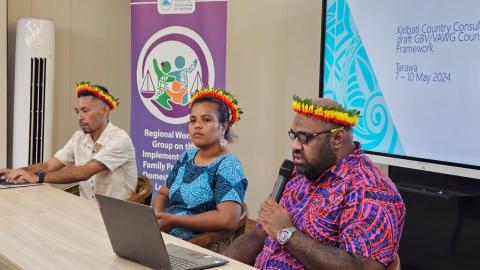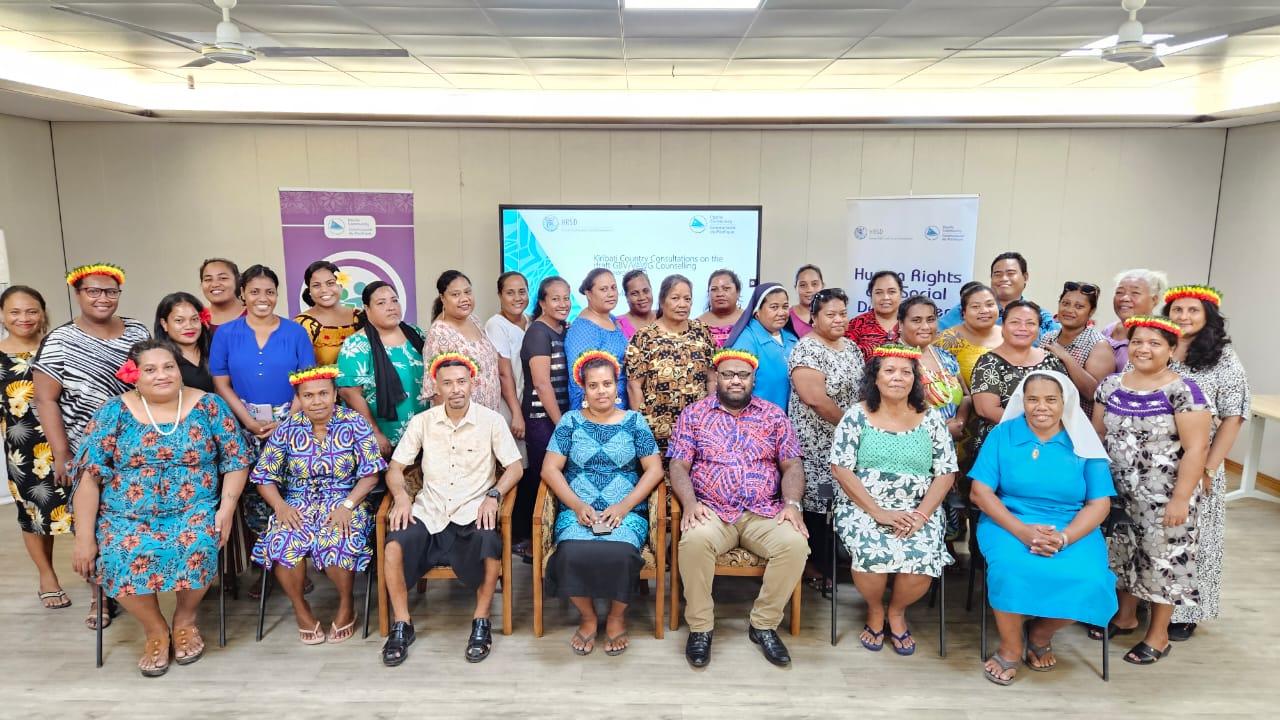Kiribati has begun national consultations as part of a regional project to ensure consistently high quality standards for Pacific counselling services provided to survivors of gender-based violence and violence against women and girls.
This week’s consultation in Kiribati is the last in a series for the Draft Regional Gender Based Violence / Violence Against Women and Girls Counselling Framework. Consultations have also taken place in Papua New Guinea and Samoa.
Once finalised and released across the Pacific, the Framework will support more women, girls and other survivors of gender-based violence (GBV) and violence against women and girls (VAWG) to have access to consistently high quality counselling services support.
The Framework’s consultations and development is an initiative of the Regional Working Group on the Implementation of Family Protection/Domestic Violence Legislation (RWG) working together with crisis centres and other members of the Pacific Women’s Network Against Violence against Women (PWNAVAW), UN Women Fiji MCO and SPC.
“The provision of counselling services tailored to the needs of GBV/EVAWG survivors living with or escaping from violence, is a critical area of support and is an essential service,” said Livai Sovau, alternate to the Chair of the Regional Working Group on Domestic Violence/Family Protection Legislations with Secretary Joy Heine, both from the Nauru Department of Women's and Social Development Affairs (WASDA).
Mr Sovau added how the framework will ensure that GBV/EVAWG “counselling practices align to relevant standards and seek opportunities to evaluate and improve current services that are provided”.
Teretia Tokam, founder and coordinator for the Kiribati Women and Children Support Centre (KWCSC), explained the honor “to have this consultation in Kiribati and take a lead role in this important regional work.”
“We have seen firsthand the impacts of gender inequality and gender-based violence on our community, and we are committed to creating a positive change,” Mrs Tokam said, adding: “For more than six years, the KWCSC has been working tirelessly to support women and children who are survivors of domestic violence.”
“Having the consultation on the draft of the regional GBV/VAWG counselling framework in Kiribati further strengthens our role as the first-ever GBV counselling service provider in Kiribati. Thus, taking a lead role in the regional work also ensures that the framework is contextualized to the specific needs of women and children survivors of domestic violence,” she said.
From government, Eera Teakai from the Kiribati Ministry of Women Youth Sport and Social Affairs (MWYSSA) explained how the nation’s high rate of violence "obliges the government to take fundamental steps to pass the law to address domestic violence, called the Te Rau N Te Mwenga Act 2014 or Family Peace Act, that recognises domestic violence as criminal while putting in place measures to address it when it happens."
Those measures include the development of the Eliminating Sexual and Gender Based Violence (ESGBV) Policy and the Gender Equality and Women's. Development Policy 2019-2022, according to Mrs Teakai. She added that having a standard counselling framework will help counsellors to provide a quality service that "will assist a survivor in stabilising, recovering, and becoming empowered."
The RWG-led workshop in Kiribati is coordinated by SPC and funded by the New Zealand Government with technical support from the Australian Government, through Pacific Women Lead at SPC.

About the Framework
The draft framework contains ethical principles and practice standards for the delivery of GBV/VAWG counselling services to survivors/victims in the Pacific, built from decades of GBV counselling experience of crisis centres in the region, and aligned to human rights and survivor centred approaches.
It is created to suit the Pacific context and responds to a 2017 review of counselling services and practice across 14 Pacific countries that found significant diversity in the services, qualifications and approaches of GBV counselling.
The draft framework considers countries where counselling services are limited and responds to the need to provide counselling services in remote areas, as well as in times of crises.
It is based on good practices internationally and especially from the Pacific region where quality GBV counselling has been delivered for more than 30 years by crisis centres.
The Framework’s development includes a series of consultations across Pacific countries, with Kiribati being the last in the review and finalisation process.
United in the Framework’s development
The Pacific-led Framework is being driven by an extensive network of Pacific partners collaborating on the development, consultation and final drafting.
The Regional Working Group on the Implementation of Family Protection/Domestic Violence Legislation (RWG) has a Counselling Sub-Committee working across a range of GBV counselling issues, one of which is the Framework as detailed on the RWG webpage: Regional Working Group (RWG) on the implementation of family protected/domestic violence legislation.
For the Framework’s development, there is a Technical Taskforce (TTF) comprising the Counselling Sub-Committee together with five crisis centres, UN Women Fiji Multi-country Office and the Pacific Community (SPC). The groups meet regularly, such as in May 2023 - May 2023 sub-committee Facebook post – and April 2024 - RWG’s Technical Taskforce Meeting for the counselling framework.
Members of the TTF include: Gender Affairs Department, Office of the Prime Minister (Tuvalu Government), Ministry of Women’s and Social Development Affairs (Nauru Government), Ministry of Internal Affairs (Cook Islands Government), Ministry of Women, Children and Poverty Alleviation (Fiji Government), Ministry of Women, Youth, Children and Family Affairs (Solomon Islands Government), Fiji Women’s Crisis Centre, Tonga Women and Children Crisis Centre, the Vanuatu Women’s Centre, Family Support Centre, Kiribati Women and Children Support Centre, UN Women Fiji Multi-country Office, and Pacific Community (SPC).
More details:
